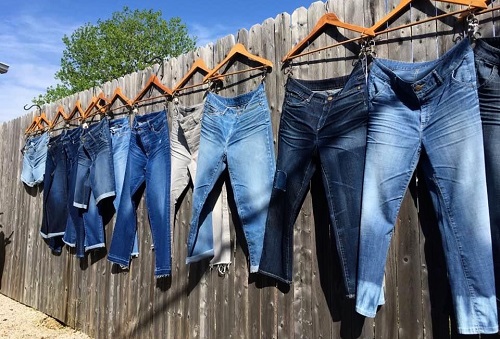FW
The Garment Worker Protection Act (#SB1399) passed by the California Senate on June 25 seeks to guarantee a minimum wage for garment workers in California while dismantling the piece-rate system that currently prevails in the industry.
The Garment Worker Protection Act was authored by Californian Senator Maria Elena Durazo and sponsored by Garment Worker Center, Bet Tzedek Legal Services, the California Labor Federation, and Western Center on Law and Poverty.
According to Remake, a non-profit organization that advocates on behalf of factory workers, SB1399 will prevent wage theft by ensuring fashion brands cannot use lawyers or subcontracting to avoid accountability under [the] law.
It will also end wage theft via the piece rate model of payment, a form of payment based on the number of garment pieces sewn in a day versus than by hours worked. The piece-rate makes minimum wage out of reach and pays factory workers well below a livable wage. The bill is seen as a closer step to equality. Further details about the bill can be found on its website.
Amazon has launched a new fund to support the development of sustainable technologies and services which will enable the retailer to meet The Climate Pledge by 2040. The fund will back visionary companies whose products and services will facilitate the transition to a zero carbon economy.
The Climate Pledge Fund will invest in companies in multiple industries, including transportation and logistics, energy generation, storage and utilization, manufacturing and materials, circular economy, and food and agriculture. Over time, Amazon will also look for opportunities to involve other Climate Pledge signatories in this venture investment program.
The fund was cofounded last year by Amazon and Global Optimism. It involved a commitment by these two companies to reach the Paris Agreement ten years early and be net zero carbon by 2040. Verizon, Reckitt Benckiser (RB), and Infosys recently joined the pledge to accelerate investment in innovations for the zero carbon economy of the future.
 At the second Kingpins24 virtual denim show held in New York on June 23 and 24, the sustainable benefits of hemp fibre were referenced by many Monforts customers including AGI Denim, Artistic Milliners, Black Peony, Calik, Cone Denim, Naveena Denim Mills (NDM) and Orta.
At the second Kingpins24 virtual denim show held in New York on June 23 and 24, the sustainable benefits of hemp fibre were referenced by many Monforts customers including AGI Denim, Artistic Milliners, Black Peony, Calik, Cone Denim, Naveena Denim Mills (NDM) and Orta.
“Hemp is an easy to grow fibre which requires no irrigation, no fertilizers, no herbicides and no chemicals,” said Allan Little, Director of Product Development for Cone Denim, which has recently launched its Sweet Leaf collection featuring the fibre. “Significantly, it also uses fifty per cent or even less water than cotton in cultivation.”
“Hemp has a unique colour and adds a different cast to our indigo, the drape and texture of the fabrics is different and it even adds a bit of a unique hand, so combined with its sustainable credentials we are proud to be bringing the Sweet Leaf collection to the market.”
US supply chain
Cone is currently sourcing its hemp from France, but with much of its manufacturing now in Mexico – and with the introduction of the US Farm Bill in 2018 which has legalised the growing of legal hemp – is exploring the possibility of investing in the US supply chain.
legalised the growing of legal hemp – is exploring the possibility of investing in the US supply chain.
Little emphasised, “It’s a unique crop, so coming up with the right stalk to provide the right fibre is challenging. We’ve experimented with different types of seed and various methods of decortication.”
Complete success
In 2019, Naveena (NDM), headquartered in Karachi, introduced fabrics featuring up to 51 per cent hemp content in blends with Tencel and recycled polyester and this year has developed the first 100 per cent hemp denims.
“The response to the fabrics we showed last year was incredible and we were looking forward to the response to this latest development – which everyone was asking for – at the Kingpins show in Amsterdam, which unfortunately was unable to go ahead,” says NDM’s Director of Marketing Rashid Iqbal. “We produced initial samples in an undyed state because we were not sure how the wet spun yarn would react in the dyeing, but I’m happy to say we have had success in this respect and are now able to provide one hundred per cent indigo dyed hemp denim.”
Environmental benefits
“Differentiation is the key in the highly-competitive denim industry and we have assisted our customers with trials and optimised processing parameters for a range of different fibres, including hemp, both at our Advanced Technology Centre in Germany and at their own mills around the world,” said Hans Wroblowski, Monforts Head of Denim. “Given the environmental benefits of hemp, and the liberalisation of its cultivation in many parts of the world, the interest in it now comes as no surprise. We have the technologies and know-how to help our customers to fully maximise their hemp denims at all post-weaving stages of production.”
The latest Monforts innovation for denim is the CYD yarn dyeing system. This technology is based on the effective and established dyeing process for denim fabrics that is now being applied for yarn dyeing.
The CYD system also integrates new functions and processes into the weaving preparation processes – spinning, direct beaming, warping and assembly beaming, followed by sizing and dyeing – to increase quality, flexibility, economic viability and productivity. A full CYD line is now available for trials at the company’s Advanced Technology Centre
 The ongoing pandemic is altering the retail landscape in America as brands and their landlords are suing each other over rent payments. Brands like Valentino and Victoria’s Secret are filing lawsuits against their landlords. Valentino has complained that landlords are trying to exit from their leases while Victoria’s Secret has alleged its landlord SL Green Realty has leased it a shattered landscape. Landlords too have made preemptive strikes of their own. On June 4, Simon Property Group sued Gap rover non-payment of rents and other charges totaling $66 million.
The ongoing pandemic is altering the retail landscape in America as brands and their landlords are suing each other over rent payments. Brands like Valentino and Victoria’s Secret are filing lawsuits against their landlords. Valentino has complained that landlords are trying to exit from their leases while Victoria’s Secret has alleged its landlord SL Green Realty has leased it a shattered landscape. Landlords too have made preemptive strikes of their own. On June 4, Simon Property Group sued Gap rover non-payment of rents and other charges totaling $66 million.
Though, landlords have always had an upper hand in legal battles over rent, retailers may plead exception from old rules owing to the massive impact on their operations. The outcome of these lawsuits will signal which way the law is going.
A mid-way solution
Retailers may have some leverage in these legal battles as landlords may accept their proposal to lower rents in the absence of any alternative income. In its lawsuit Valentino argues value of the space it rented seven years ago in 2013 has fallen drastically. The brand could earlier count on a steady flow of wealthy tourists and New Yorkers. However, now Midtown Manhattan is a ghost town with many offices in the region remaining empty and tourism being decimated. Average New York retail rent dropped 9 per cent in the first quarter of 2020, according to brokerage CBRE.
argues value of the space it rented seven years ago in 2013 has fallen drastically. The brand could earlier count on a steady flow of wealthy tourists and New Yorkers. However, now Midtown Manhattan is a ghost town with many offices in the region remaining empty and tourism being decimated. Average New York retail rent dropped 9 per cent in the first quarter of 2020, according to brokerage CBRE.
Though both of them have adamantly stuck to their opinions, they are aware that the best solution to this problem is not to crush any of them. As Danielle Garno, Head of the fashion, beauty and luxury goods practice at the law firm Cozen O’Connor says if landlords don’t budge, tenants may either default on payments or declare bankruptcy which may leave them with an empty space on Fifth Avenue.
Shifting to a revenue sharing model
One form of compromise that landlords and tenants can reach involves converting a lease from a fixed monthly rate to a revenue-sharing model. Already, many mall anchor tenants including Neimcen Marcus in Hudson Yards are using this model. Some landlords are also helping struggling tenants by buying stakes in their operations. For instance, Brookfield Properties bought a stake in its ailing retailers for $5 billion. The landowner is also planning to jointly bid for a stake in JC Penney along with rival Simon Property Group. Landlords buying stake in these retail chains may prevent retailers from closing their stores, says Deborah Weinswig, Founder and Chief Executive, Coresight Research. However, increase in the trend of online shopping may worsen their plight post COVID-19.
VF Corporation is geared up for tremendous growth in Greater China including Mainland China, Hong Kong SAR and Taiwan. The region is currently representing about 65 per cent of VF’s total business in the Asia Pacific Region and expects to grow the same to nearly 80 per cent by the fiscal year 2024.
In recent years, Asia Pacific business has been the key growth driver for VF – owner of renowned brands like Vans, The North Face, Timberland and Dickies.
To achieve this growth, the company has announced organisational changes to strengthen and accelerate its business strategy in the Asia Pacific Region. By creating the new position of President, Greater China, the company is leaning even further into the many opportunities it sees to elevate its business and brands in this fast-moving, digitally-driven marketplace. It’s looking forward to announce appointment later this summer.
Kevin Bailey, EVP & Group President, APAC (Asia-Pacific) of the company will continue leading the company’s Asia Pacific Region but will relocate from Hong Kong to Denver, Colorado, where he will also assume leadership of the company’s Emerging Brands platform, which includes the Altra, Eagle Creek, JanSport and Smartwool brands, and the Kipling and Icebreaker brands in the Americas Region.
The value of Hong Kong’s re-export of apparel and textile products during January to April ’20 period has declined by 29 per cent while the exports of locally made products increased significantly.
According to the statistics released by the Census and Statistics Department (Hong Kong) and compiled by the Hong Kong General Chamber of Textiles, the region re-shipped apparel and textile worth HK $ 32,689 million in the said period.
The decline in re-exports can be attributed to the impact of pandemic outspread. Of total re-export value, apparels contributed HK $ 18,600 million and the share of textiles was HK $ 14,090 million. Mainland China accounted for HK $ 7,761 million of this re-export value, declining around 26 per cent on the yearly note. On the other hand, the US and EU accommodated HK $ 5,274 million and HK $ 4,677 million, respectively, falling by 45.50 per cent and 23.60 per cent from their respective imports from Hong Kong.
Hong Kong’s re-export to ASEAN – a 10-nation bloc – too declined by 19.80 per cent and it clocked HK $ 6,077 million from the region.
British retailer Harrods will unveil its much-talked about new concept store at Westfield London on July 3, 2020.
The new concept store, spread over a wide area of 80,000 square feet and 2 floors, will display the stocked items including womenswear, menswear and kidswear along with accessories.
And shoppers will have best of the brands to select that includes Stella McCartney, Chloe, Off-White and Balmain, among several others – additionally there will be weekly product drops.
Assuring the renowned Harrods experience to all its shoppers at the new outlet, Lydia King, Fashion Director, Harrods, said “Harrods is known to provide the ultimate in luxury and our offerings at the new outlet will be no different.”
It will be interesting to see the response of the shoppers to the store and also see how much it improves the shopping experience at Harrods’ Knightsbridge store.
Besides menswear, womenswear, kidswear and accessories, London-based Harrods also offers beauty products, home appliances, furniture, sporting gear and jewellery, among others. It generates revenue of £2 billion.
The fallout of COVID-19 outbreak for a country like Bangladesh is devastating where the economy and employment generation principally depend on garment manufacturing and exports. BGMEA has taken all-out and multi-pronged efforts to save the industry when large-scale of order cancellations by the global buyers had wreaked havoc and number of garment makers shutting down their operations.
In the last couple of months around 419 garment manufacturing units to remain closed due to the large scale of order cancellations by the western buyers and lack of new work order. The more alarming is that 100 have now shut down operations permanently out of these 419 units. In such a scenario, BGMEA under the leadership of Rubana Huq issued an official letter to British billionaire Philip Day’s Edinburgh Woollen Mill (EWM) group, demanding to pay up for clothes shipped before 25 March.It has taken the stand of blacklisting specific buyers and has begun with EWM. According to the Bangladeshi factory owners, they had singled out Edinburgh Woollen Mill asking for large discounts which violated local laws, international standards and defied the principles of ethical sourcing.
BGMEA has also started engaging different international rights groups to ensure that international retailers and brands pay local suppliers besides working closely with the Bangladesh Government and the country’s missions abroad to initiate parallel track of discussions with foreign buyers and Governments.
The government announced an incentive package of Tk 30,000 crore to banks to provide loans to companies in the industrial and service sectors affected by the COVID-19. Bangladesh Bank has set up a revolving refinancing fund to provide half of this loan that is Tk 15,000 crore. All the banks will give a total of Tk 28,865 crore and the non-bank financial institutions will distribute Tk 1,135 crore.
According to the central bank’s policy, the term of this loan will be three years. Industries that have already availed capital from the bank will be able to borrow up to a maximum of 30 percent from this fund. However, only the victims will get this loan. Debtors will not get any loan from this fund. Not only defaulters but also traders who have rescheduled loans more than three times won’t be able to get the loans.
The loans that have been given to be recovered from the COVID-19 pandemic, however, for such critical preconditions it is not working accordingly. Also, the ability of customers to repay the loan is much less than before. So, the bankers are being very careful in giving loans for this.
The loans will be distributed by several banks such as state-owned Agrani Bank which will be able to lend Tk 914 crore from this fund. The bank has already sanctioned a loan of Tk 19 crore in the name of Wata Chemical, which is listed on the stock exchange. Hundreds of companies including Jamuna Group, Thermax, Acme, Diamond Cement, PHP Group, Apex Footwear, City, Nital Niloy Group have applied for loans from the bank.
According to GlobalData, almost 20 per cent of people under 45 have bought more clothing since coronavirus lockdown measures were put in place.
The anaylst said 19.3 per cent of consumers aged 16 to 45 have bought more clothing since the Covid-19 pandemic began, despite consumers in general de-prioritising non-essential items due to economic uncertainty and a lack of social events.
That figures compared to only 7.4 per cent of over 45s who have bought more clothing since the pandemic started.
Online clothing purchases have also served as a treat, and helped to uplift younger consumers’ moods throughout the pandemic, especially for those that have continued working and have had more disposable income, due to cancelled holidays and social activities.
GlobalData’s research was based on a sample of 500 respondents across 11 countries, conducted between May 26-31. Lockdown in the UK officially began March 25. As the end of lockdown and social distancing begins to near, GlobalData said retailers were likely to experience the greatest uplift in trade from younger demographics as they seek new clothing to wear for future events.
GlobalData said that as a result, retailers should start to adapt their social media strategies accordingly, by gradually incorporating fewer stay-at-home outfits into their posts or to provide more inspiration for upcoming gatherings.
The data and analytics firm also recommended retailers were more inclusive in their marketing campaigns, especially in light of the surge in the global Black Lives Matter movement and calls for better diversity and representation in all sectors.












